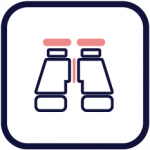Summary
In this first part of our course, we brought to light some of the thinking behind the shift in online assessment practices taking place within Ontario post-secondary institutions. We looked at the forces driving this cultural change and outlined why it is so important to our learners’ academic and career success.
We asked you to reflect honestly and critically on your own assessment practices, and whether they are measuring what you really want to know about your learners. Finally, we encouraged you to consider a different approach to online assessment and to rethink your assessment mindset. We realize this may be a difficult journey for many instructors – congratulations on making it this far! Continue with us on this road as we explore how to put this new assessment approach into practice.
Key Takeaways
- Assessment and feedback should be relevant, meaningful, and designed to promote engagement and learning.
- Traditional assessment methods focus heavily on assessing the articulation of knowledge and comprehension of ideas.
- Assessment practices need to evaluate the application of knowledge and transferable skills to work and life situations.
- Including authentic or alternative assessments in your course promotes a balanced, equitable, and inclusive assessment strategy.

Explore Further
Clarke, K. (2018, April 30). How to Make Assessment Work for You and Your Students. YouTube. [Video]
Egan, A., (2018). Improving Academic Integrity through Assessment Design. Dublin City University, National Institute for Digital Learning (NIDL). [PDF]
Steinhauer, E., Cardinal, T., Higgins, M., Madden, B., Steinhauer, N., Steinhauer, P., Underwood, M., Wolfe, A., & Cardinal, B. (2020). Thinking with Kihkipiw: Exploring an Indigenous Theory of Assessment and Evaluation for Teacher Education. In S. Cote-Meek, & T. Moeke-Pickering (Eds.), Decolonizing and Indigenizing Education in Canada (pp. 73-90). Canadian Scholars.

References
American Association of Colleges & Universities. (n.d.). Essential Learning Outcomes. https://www.aacu.org/essential-learning-outcomes
Clarke, K. (2018, April). How to Make Assessment Work for You and Your Students. [Video]. Seneca Teaching & Learning Day Winter 2018. https://employees.senecacollege.ca/spaces/39/the-teaching-learning-centre/videos/PETRA.MISALJEVIC/keynote-presentations/5077/-how-to-make-assessment-work-for-you-and-your-students-by-kristen-clarke
EDUCAUSE Learning Initiative. (2009). Seven things you should know about Personal Learning Environments. [PDF] https://library.educause.edu/-/media/files/library/2009/5/eli7049-pdf.pdf
Egan, A., (2018). Improving Academic Integrity through Assessment Design. Dublin City University, National Institute for Digital Learning (NIDL). [PDF] https://doras.dcu.ie/22683/1/11193_Full Report-LR.pdf
Ministry of Colleges & Universities. (2009a). Essential Employability Skills. http://www.tcu.gov.on.ca/pepg/audiences/colleges/progstan/essential.html
Ministry of Colleges & Universities. (2009b). Ontario Qualifications Framework – Section 11 Baccalaureate/Bachelor’s Degree: Honours. http://www.tcu.gov.on.ca/pepg/programs/oqf/certificate11.html
University of Ottawa. (2021, May-June). Online Assessment Perceptions, Practices, Needs and Recommendations: A Longitudinal Survey of uOttawa Students, Instructors and TAs. Survey data analysis completed by the University of Ottawa for the Rethinking Assessment Strategies for Online Learning course.
Wiggins, G. (1989). A true test: Toward more authentic and equitable assessment. Phi Delta Kappan, 70(9), pp.703-713.

